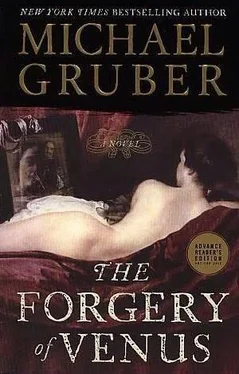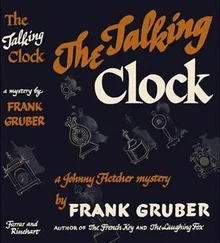I found myself lying face-up on top of Franco, who also lay face-up on the sidewalk, the pair of us like a couple of lounge chairs stacked poolside. He’d pulled me so hard he’d fallen down on his back. He scooted out from under me and stood scanning the crowd, but whoever had done it had vanished. He helped me to my feet, or foot, because the left one was out of action. According to Franco, the guy had snaked in through the crowd and hit me from the right. Neither of us thought it’d been an accident or a maniac.
We hobbled back to the hotel, which fortunately was only about a hundred yards distant. I thanked him for saving my life, and he shrugged and said, “No problem.”
When we got back to the suite he tended me like a mommy, fetching ice for my wounded heel, ordering new sneakers from the concierge, pouring me a scotch. Yeah, he was just doing his job, but it was nice anyway, a sere form of human contact, but better than the howling waste of isolation into which I had fallen. Somebody just tried to kill me, but I was more terrified of life than of imminent death; it left me strangely, unnaturally calm. I have a feeling that’s what my dad was like on Okinawa, or he wouldn’t have been able to see what he saw and make it into art.
Krebs had been out somewhere with Kellermann, but when he came back and got the story of the attempted murder he immediately turned our lazy and louche little ménage into the Afrika Korps: orders snapped out, scurrying of the foot soldiers. Within an hour of his return, we were en route to the airport.
“Where are we going?” I asked him when we were in the car. I’d asked before but no one had bothered to answer me.
“We’ll fly to Munich,” he said. “I’ve arranged a jet.”
“What’s in Munich?”
“Many cultural wonders, but we’re not going to stay in Munich. It’s the nearest major airport to my home.”
“You’re taking me home?”
“Yes. I believe it’s the only place I can guarantee your safety until this thing is finished and the picture has been sold and my associates are paid off.”
“Your associates just tried to kill me,” I said. I guess I was a little irritated that he hadn’t made more of a fuss, oh, my dear Chaz, can you forgive me, I’m sorry, are you all right? And like that, but nothing: he listened to Franco’s report of the incident and barely looked at me while we were getting ready to leave.
He patted my leg and said, “Cheer up, Wilmot. Imagine that you are Caravaggio, fleeing a charge of murder, or Michelangelo defying the Pope, or Veronese under the thumb of the Inquisition.”
“I never wanted to be any of those guys.”
“No, you wanted to be Velázquez, with an honorable sinecure in the royal household, a liveried coat, and a bag of golden reales every quarter.”
“Yeah, and I thought that’s what I was getting.”
“So you shall, but you know even Velázquez had to go to dangerous Italy twice in his life, and not only to look at pictures. And didn’t he plunge into a risky affair with that woman, as you yourself have recounted, and didn’t he paint those wonderful nudes?”
I stared at him. “That was a fantasy. That was the drug screwing with my head.”
And now he turned and looked at me, and it was uncanny, like he’d turned into a different person or like I was seeing him properly for the first time. The slightly manic air he usually had was gone, and he looked tired, and older, and somehow more caring. I have no idea how he did it. He looked at me this way for what seemed like a long time. Then he said, “Was it really? You spend a good deal of time in a fantasy world, don’t you? Perhaps this idea that you forged a Velázquez accepted by the whole world as genuine was also a fantasy. Perhaps it really is genuine after all. How could you tell?”
“What do you mean, how could I tell? I remember every fucking brushstroke on that thing.”
“Yes, and your memory is full of things that did not in fact happen to you, as you yourself confess. So this is not an impressive claim.”
“But the painting is real. I saw it. I saw Salinas test it. I saw you phony it up with that Bassano fake.”
“Did you? Tell me, do you actually know who I am?”
“Yes, of course I know who you are. You’re Werner Krebs, art dealer and criminal mastermind, and for some reason you’re trying to fuck with my brain.”
“My friend, your brain is, as you put it, fucked up beyond my poor power to add or reduce. And why would I do that, if I am such a criminal? Perhaps I am actually trying to bring a brilliant but psychotic artist back to reality. Perhaps I am a psychiatrist hired by your family to take you to my clinic in rural Bavaria.”
“Oh, right. But I don’t have the kind of family that shells out for Bavarian clinics, remember? Lotte can barely pay her rent, I have a sick kid, and my son from my first marriage wouldn’t pay a nickel to save my life.”
“Yes, but perhaps that is the case only in your paranoid ideation. Suppose, however, that in truth you are a well-known and famous artist, whose work routinely sells in the six figures, and that all these memories of failure and frustration are part of the psychosis.”
And now that whole New York thing, which I had been repressing all this time, came snarling out of its box and started tearing big chunks out of my sense of who I was. The result was paralyzing terror. What did I know? Montaigne’s question, and I couldn’t answer it. I shook. I sweated. I shut down: the traffic sounds and Krebs’s voice seemed to come through thick insulation.
“Wilmot,” he said, in that same calm professional voice, “believe me when I say that although you are a brilliant painter, you have no way of distinguishing what is real from what is the product of your afflicted brain and of the drug you were given.”
“We went to see those gangsters,” I said dully. “I was pushed in front of a bus. I remember that.”
“Yes, this is how you interpret your appearance before, let us say, a mental health commitment board-international gangsters. And you jumped in front of the bus, Wilmot. This is why Franco must follow you everywhere. You could have been badly injured. Well, in any case, here we are at the airport.”
“I’m not talking to you anymore,” I said.
He smiled. “I’m sorry to hear that,” he said, “but we shall see what happens. It is early days yet in our relationship.”
They led me out of the car and onto a plane; I did as I was told, without will, moving slowly like one of those sad brain-damaged vets you see in the documentaries, and we flew out of Spain on an elegant little thing, a six-passenger job carrying me, Krebs, Franco, and Kellermann. Kellermann slept in the rear the whole way, snoring; Franco was next to me and Krebs was up front talking on his cell phone in German.
“Franco,” I said when we were up in cloudland, “tell me, did you get a look at the guy who pushed me in front of the bus?”
“What guy?” he answered. “You jumped.”
Stupid to ask, really, Franco a faithful servant of the king. Although Krebs had said he wasn’t, that he worked for the bad guys. Who knew? Was that the first mirror in the hall of mirrors? Were there bad guys at all?
I reclined my seat and tried not to think about anything. It’s harder than it sounds, although apparently the holy men do it all the time. It must be very restful, not to think.
We landed, we got in a big Mercedes, just me and Krebs and Franco-Kellermann had been assigned some errand-and we drove north on the A9 autobahn. It’s nice to drive in a powerful car on the German autobahn: there are no speed limits and the peasants are wise enough to keep out of the left lane. I got a kick out of the big blue signs that read Ausfahrt Dachau; gotta love the Germans-they’re sorry, but not that sorry, not sorry enough to change the name of a town that’s a curse in every other civilized country. I mentioned this to Krebs, who gave me the kind of look you give to kids who mention poo-poo at the dinner table, and then he started talking about where we were going, a part of Bavaria known as the Fränkische Alb, a real beauty spot apparently, quite isolated even in crowded Germany. His father had bought the house just after the war, along with a substantial area of surrounding land. Much of the neighborhood was a nature preserve, but he had fishing and hunting rights on his own land. Did I like to fish? To hunt?
Читать дальше












